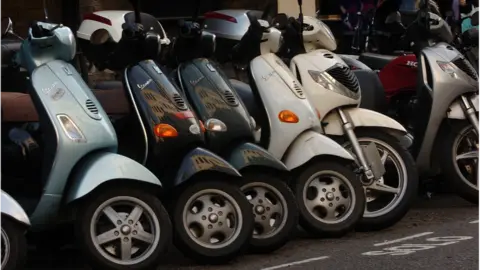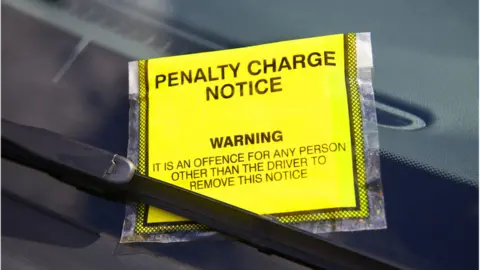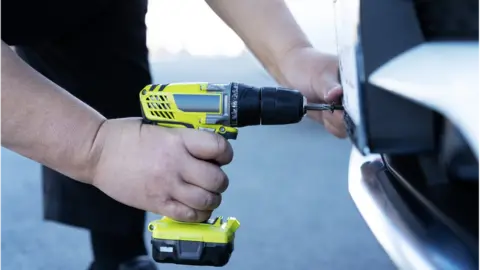Motorist describes 'frustration' of proving number plate cloning after fines
 Ian Nicholson, Press Association
Ian Nicholson, Press AssociationA man whose scooter number plate was cloned, leading him to receive numerous parking and speeding tickets, has described the "incredibly frustrating" process of proving his innocence.
Bill Luckhurst began receiving a series of Penalty Charge Notices (PCNs) in 2021, with incriminating pictures of a near-identical vehicle to his own.
He bought a new, personalised plate but began receiving PCNs again soon after.
The DVLA says it takes number plate crime "very seriously".
It added it was working to clamp down on number plate crime.
In an interview on the You and Yours programme on BBC Radio 4, Mr Luckhurst said he received the first PCN in May 2021, and after looking at the time, date and location, he realised it "didn't add up".
He said he was at work or at home at most of the times shown on the PCNs, and the photos showed the vehicle in parts of London he never visited.
But "anxiety kicked in" after he saw the photos showed a scooter with the same model and colour as his.
He received five more PCNs until the end of August, and so started to gather evidence of the differences between his scooter and the clone scooter pictured on the PCNs.
"I started to look at my own scooter and there were perceivable differences like scratches and stickers," Mr Luckhurst said.
He took photographs to highlight the differences, wrote letters to his local MP, and got a crime reference number from the police.
Mr Luckhurst says he "did everything I possibly could" to build a strong case and managed to avoid the fines.
 Getty Images
Getty ImagesHe "felt a sigh of relief" after spending about £250 to get a new, personalised number plate, but it was "short-lived".
A few weeks ago, he received yet another PCN from a fixed speeding camera, showing a motorcycle identical to his, sporting his new number plate.
Mr Luckhurst described the situation as "incredibly frustrating" as he thought "that was the end of it" when he bought a new number plate.
The DVLA has said it takes the matter "very seriously" and "appreciates how distressing this can be for innocent motorists".
It says it is currently working with the police and other government departments to "improve the identification and enforcement of number plate crime", and advises affected motorists to return the fines and report the crime to the police.
'Enemy of the motorist'
Simon Williams, a spokesperson from the RAC called number-plate cloning "the enemy of the modern motorist".
He added crimes such as the one Mr Luckhurst has been affected by were on the rise due to organised crime, as well as people trying to avoid the congestion charge, the Ultra Low Emission Zone and other fines.
Mr. Williams said there were some things motorists could do to try and protect themselves from number plate cloning.
 Getty Images
Getty ImagesHe advised vehicle owners to get a tamper-proof number plate to deter people from trying to remove the registration plate from their car.
He also said having a private number plate like the one Mr Luckhurst purchased should reduce the likelihood of being targeted, but cloning was a "very difficult crime to avoid".
Mr Luckhurst's advice for other victims of cloning, or any other type of fraud, is "don't bury your head in the sand".
"Be proactive and tell everyone you can about it," he told BBC London, encouraging people to gather evidence to fight their PCNs despite the anxiety they may feel.
To hear the full interview on BBC Sounds, visit the You and Yours programme page here.
For more information on car cloning and what to do if you are affected, see advice from the RAC here.

Follow BBC London on Facebook, Twitter and Instagram. Send your story ideas to [email protected]
